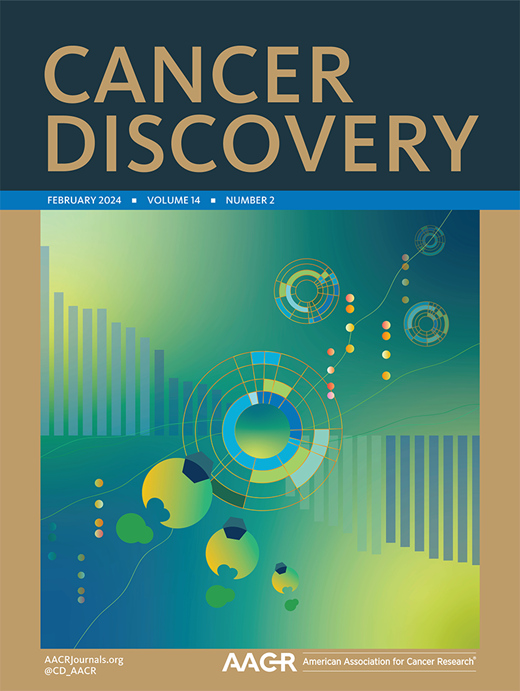p53缺失诱导对病毒模仿的耐受性是早期肿瘤发生中免疫逃避的一种机制
IF 29.7
1区 医学
Q1 ONCOLOGY
引用次数: 0
摘要
总结:Ishak和他的同事报告说,p53的缺失破坏了组成性异染色质,使免疫原性重复元件的转录成为可能。与急性病毒模仿激活不同,癌症起始期间由p53缺失介导的慢性病毒模仿反应诱导对细胞质核酸的耐受性,最终降低细胞免疫原性,作为免疫逃避的一种策略。参见Ishak等人的相关文章,第793页本文章由计算机程序翻译,如有差异,请以英文原文为准。
Loss of p53 Induces Tolerance to Viral Mimicry as a Mechanism of Immune Evasion in Early Tumorigenesis
Summary: Ishak and colleagues report that the loss of p53 disrupts constitutive heterochromatin, enabling the transcription of immunogenic repetitive elements. Unlike acute viral mimicry activation, a chronic viral mimicry response mediated by p53 loss during cancer initiation induces tolerance to cytosolic nucleic acids, ultimately diminishing cellular immunogenicity as a strategy for immune evasion. See related article by Ishak et al., p. 793
求助全文
通过发布文献求助,成功后即可免费获取论文全文。
去求助
来源期刊

Cancer discovery
ONCOLOGY-
CiteScore
22.90
自引率
1.40%
发文量
838
审稿时长
6-12 weeks
期刊介绍:
Cancer Discovery publishes high-impact, peer-reviewed articles detailing significant advances in both research and clinical trials. Serving as a premier cancer information resource, the journal also features Review Articles, Perspectives, Commentaries, News stories, and Research Watch summaries to keep readers abreast of the latest findings in the field. Covering a wide range of topics, from laboratory research to clinical trials and epidemiologic studies, Cancer Discovery spans the entire spectrum of cancer research and medicine.
 求助内容:
求助内容: 应助结果提醒方式:
应助结果提醒方式:


